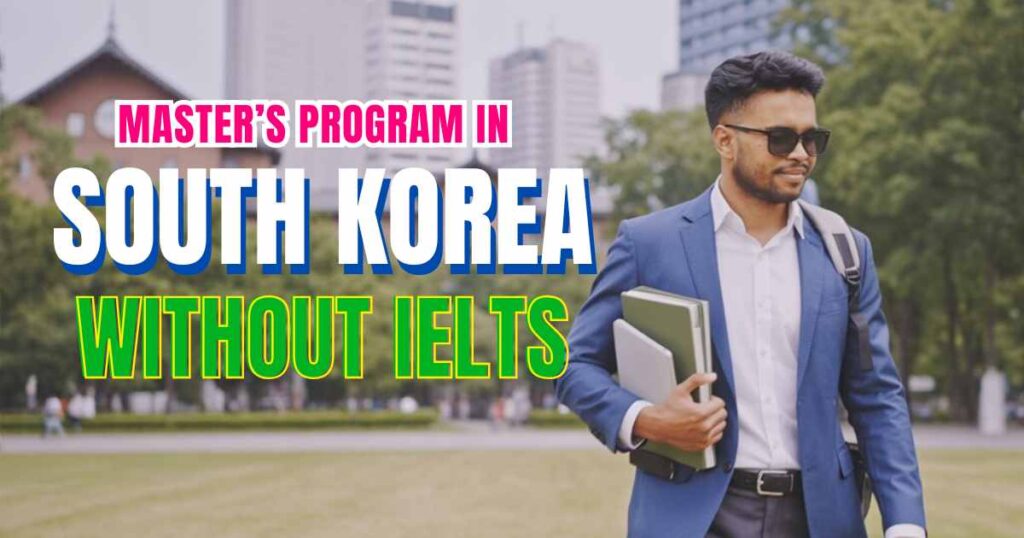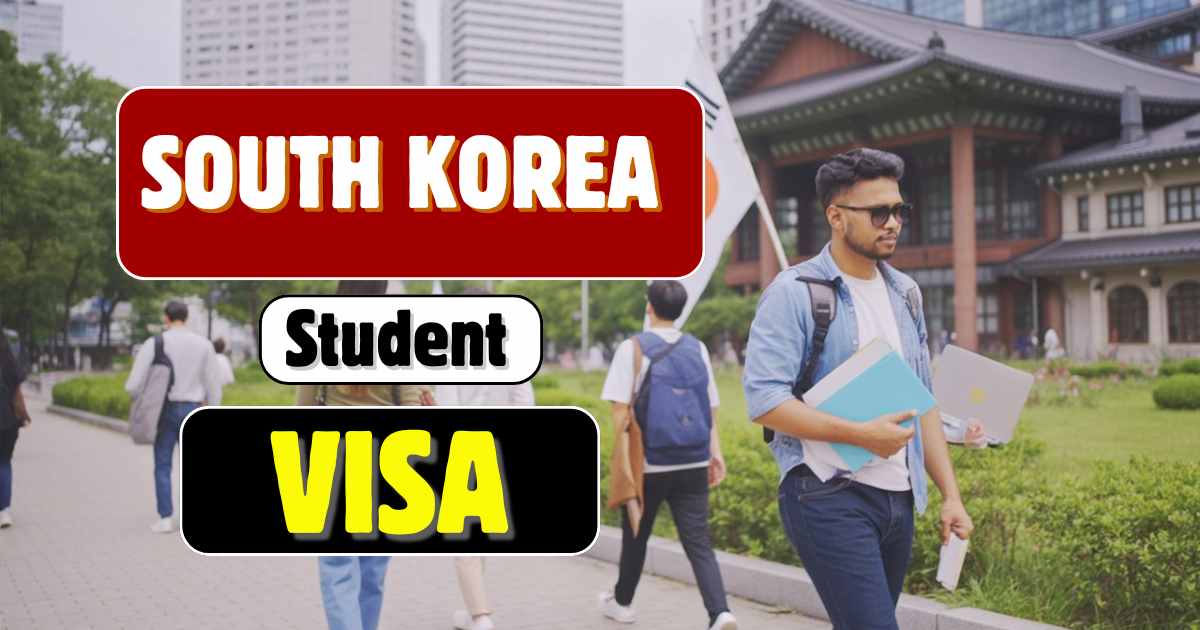Are you planning to study in South Korea without IELTS? South Korea offers excellent educational opportunities for international students, including Master’s programs in South Korea without IELTS. If you want to pursue a Master’s degree and are worried about English proficiency tests like IELTS, this guide will help you understand the South Korea student visa process, the cost of studying in South Korea, scholarship opportunities, and more.
Table of Contents
What Does “Without IELTS” Mean for South Korea Student Visa Applicants?
Many South Korean universities do not require IELTS for international students. Instead, you can use the following alternatives to prove your English proficiency:
- Medium of Instruction (MOI) Certificate from your previous institution that proves your studies were in English.
- Other English tests such as TOEFL, TEPS, or other equivalents.
- A Bachelor’s degree or other previous education in English.
This makes it easier for students who haven’t taken IELTS to apply for a South Korea student visa without worrying about the test scores.

Which Universities in South Korea Accept Students Without IELTS?
Several prestigious universities in South Korea accept international students for Master’s programs in South Korea without IELTS, provided they meet other language requirements. Some of these universities include:
- Seoul National University (SNU): Accepts a Medium of Instruction certificate instead of IELTS.
- Yonsei University: Accepts students who have completed their previous education in English.
- Gachon University: Allows applicants to submit alternative English proficiency test scores.
- POSTECH: In some cases, IELTS or TOEFL may not be required if proof of English-based education is provided.
If you are interested in studying in South Korea without IELTS, these universities can be a great starting point.
Step-by-Step Process for Master’s Application Without IELTS
Here is a simple step-by-step guide on how to apply for a South Korea student visa for Master’s programs in South Korea without IELTS:
- Research and Choose Your University
Begin by selecting a university that offers Master’s programs in South Korea without IELTS. Visit the university’s official website to verify if they accept alternative proof of English proficiency. - Prepare Required Documents
- Medium of Instruction (MOI) Certificate or TOEFL/TEPS scores if required.
- Letters of Recommendation, Statement of Purpose (SOP), academic transcripts, and degree certificates.
- Submit Your Application
Apply through the university’s online portal. Submit all required documents and pay any application fees. - Admission Offer
After acceptance, you will receive an Admission Letter, which is necessary to apply for your South Korea student visa. - Apply for South Korea Student Visa (D‑2 Visa)
Submit the following documents to your local South Korean embassy:- Admission Letter
- Valid passport
- Proof of English proficiency (MOI certificate or other alternatives)
- Financial proof (to show you can afford tuition and living expenses)
- Travel to South Korea
Once you receive your student visa, book your flight and complete the required registration process upon arrival. You’ll be issued an Alien Registration Card (ARC) shortly after arriving.
Application Timeline for South Korea Student Visa
The application period for Master’s programs in South Korea generally follows this schedule:
- Spring Intake: Applications are typically open from September–October, and the deadlines fall around November–December. Visa processing happens from January–February.
- Fall Intake: Applications begin in March–April, with deadlines around May–June, and visa processing occurs in July–August.
Always double-check specific deadlines on the university’s website.
Documents Required for South Korea Student Visa
When applying for the South Korea student visa (D‑2), you need to submit the following documents:
- Valid passport
- Admission Letter from your university
- Proof of English proficiency (Medium of Instruction certificate or TOEFL/TEPS scores)
- Academic transcripts and Bachelor’s degree certificate
- Letters of Recommendation
- Statement of Purpose (SOP)
- Proof of financial funds (bank statement, sponsor letter, scholarship offer letter)
- Passport-sized photographs
- Visa application form and fee payment
Cost of Studying in South Korea
Understanding the cost of studying in South Korea is vital for planning your education. Here’s a breakdown of the potential expenses:
Tuition Fees
- Public Universities: Tuition fees for Master’s programs in South Korea at public universities typically range from ₩2,000,000 to ₩6,000,000 (around $1,600 to $5,000 USD) per year.
- Private Universities: Tuition fees for private institutions tend to be higher, usually between ₩4,000,000 to ₩10,000,000 (around $3,200 to $8,000 USD) per year.
Living Expenses
Living costs in South Korea vary based on your lifestyle, but here’s an estimate:
- Accommodation: Dormitory costs range from ₩500,000 to ₩1,000,000 (approx. $400 to $800 USD) per month.
- Food: Monthly food expenses are generally between ₩300,000 to ₩500,000 (around $240 to $400 USD).
- Transportation: The cost of public transport is affordable, typically ranging from ₩50,000 to ₩100,000 (approx. $40 to $80 USD) per month.
Health Insurance
International students in South Korea must have health insurance, which typically costs around ₩100,000 to ₩200,000 (approx. $80 to $160 USD) per year.
Miscellaneous Expenses
Personal expenses, including books and entertainment, can be around ₩200,000 to ₩400,000 (approx. $160 to $320 USD) monthly.
Scholarship Opportunities in South Korea
There are many scholarships for international students to help with the cost of studying in South Korea. Some popular scholarships include:
1. Global Korea Scholarship (GKS)
The Global Korea Scholarship (GKS) is a prestigious fully-funded scholarship provided by the South Korean government. It covers:
- Tuition fees
- Round-trip airfare
- Living expenses (monthly stipends)
- Health insurance
GKS is available for both undergraduate and graduate students and includes Master’s programs in South Korea without IELTS.
2. Korean Government Scholarship Program (KGSP)
The KGSP offers full funding, including:
- Full tuition coverage
- Airfare
- Monthly living allowance
- Language course fees (if applicable)
3. University-Specific Scholarships
Many South Korean universities offer their own scholarships, such as:
- Seoul National University (SNU) Scholarship
- Yonsei University Global Scholarship
- KAIST Scholarships
4. Postgraduate Research Scholarships
Research-focused scholarships, including Research Assistantships and Research Grants, are available for postgraduate students.
Benefits of Studying in South Korea
Once you receive your South Korea student visa, here are some advantages you can enjoy:
- Part-time work: You can work up to 20 hours a week during your studies.
- Post-graduation stay: You may be eligible for a job-seeking visa after completing your studies.
- Cultural and social experiences: South Korea offers a rich cultural experience, vibrant student life, and modern amenities.
Obtaining a South Korea student visa for a Master’s program in South Korea without IELTS is a great opportunity for many international students. By meeting the English proficiency requirements through alternatives like a Medium of Instruction certificate and following the correct application process, you can study in one of the most dynamic and innovative countries in the world. Don’t forget to explore scholarship opportunities to help cover the cost of studying in South Korea!

